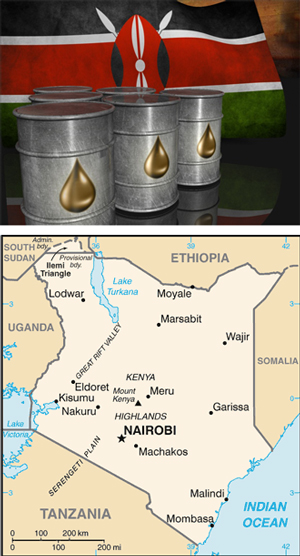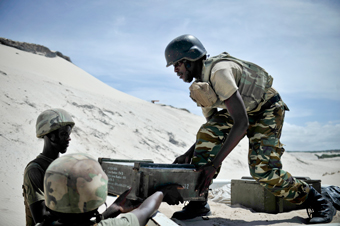-Contributing Writer-
(FinalCall.com) – The recent massacre at an upscale shopping mall in Nairobi, Kenya has yet by the majority media to be put into context.

Though the wholesale killing of innocent civilians is never warranted, this time by members of Somalia’s al-Shabaab militants, this was not an isolated attack.
According to The Guardian, “Unlike Uganda’s internationally (AMISOM) approved military support for Somalia’s fragile central government … Kenya’s was a unilateral intervention that took everyone by surprise. And their goal was less about restoring stability in Somalia and more about wiping out al-Shabaab and establishing a de facto buffer state between the two countries, a buffer state it hoped would keep Somalia’s instability from spilling over its borders and threatening Kenya’s vital tourism and shipping industry.”

According to The Nation correspondent Jeremy Scahill, while discussing al-Shabaab on Democracy Now and referencing his book Dirty Wars, “In the early 2000’s the Bush administration made a disastrous decision to put all these (Somali) warlords on the CIA payroll and they came up with this name ‘The Alliance for the Restoration of Peace and Counter-Terrorism.’ ” Mr. Scahill, who while in Somalia tracked down some of these warlords, said basically they acted as an “assassination squad,” for the U.S.
After 9/11, according to experts, Somalia had only a small handful of Al Qaeda sympathizers. Mr. Scahill said, so the CIA “ostensibly” hired warlords to “hunt these people down.” “They end up murdering vast numbers of people who were imams or religious scholars,” he continued.
That sparked a revolt and before long a coalition of no less than 12 religious leaders from different regions of Somalia formed what was called “the Islamic Courts Union (ICU).” Basically it was 12 sharia courts, in various regions of Somalia. “They came together and united as one body and they started to pool their resources in an effort to overthrow the CIA’s warlords from Mogadishu,” said Mr. Scahill.
ICU took over Mogadishu, expelled the warlords and effectively governed the capital city. Though everyone might not agree with the ICU’s type of governance, everyone would agree said Mr. Scahill, that in recent history, what stability came to Mogadishu was because of the ICU.
In 2006, the Joint Special Operations Command and the CIA–under the cover of hunting those responsible for the bombings of the U.S. embassies in Kenya and Tanzania–initiated an assassination campaign, which included the use of drones and AC-130 gunships according to Mr. Scahill. This had the desired effect of dismantling the ICU.
U.S.-backed Ethiopia then invaded Somalia committing atrocities including torture, rape, murder of innocent civilians and rendering others back to Ethiopia.

Al Shabaab, a relatively unknown group, that was on the periphery of the movement, according to Mr. Scahill, then made a stand, saying they’d be the vanguard in the fight against the U.S.-backed Ethiopian invasion.
One of the reasons for the interest in Somalia is oil exploration.
In a May 21, 2013 Oxford Journals commentary focusing on African Affairs titled, “Enough Is Enough! No More Looting of Somalia’s Oil!” by Somalia-born Mahdi Haile asserts “the corruption of which the West often accuses third-world leaders creates the very environment it needs for the control of third-world resources and for colonialism to thrive.”
The May 13, 2013 edition of the Financial Times contained an article titled “Oil thrown on the Fire.” Author Katrina Manson catalogued an influx of oil companies into Somalia.
Mr. Haile, who has worked with United Nations Intervention (UNISOM) in Somalia, as well as Doctors Without Borders declares exploitation offering the country a paltry 7 percent share of proceeds from oil exploration.
According to the Financial Times, “Attempts to carve up oil blocks before the Mogadishu government even controls the whole national territory are undermining efforts to bring peace and stability to a state that has been shattered by 22 years of war and that exports terrorism,” which Al-Shabaab says is retribution for Kenya’s invasion.
“The biggest conflicts right now among Somalis are all about oil rights … oil is the main player in all of this mess,” said Mohamad Nur of Dissident Nation, a lobby group. “But it’s also a force that allows all sides to have bargaining chips and have an equal role in the future of the nation.”

Mr. Haile, repeating a recent statement by UK Ambassador Matt Baugh, said, “The chances of reaching (an) agreement remain very fragile.” “Rival regional administrations have issued several (oil) companies rights to a clutch of overlapping blocks, redrawing the political map of Somalia in line with their own interest,” he said.
This has created what one diplomat termed a “triangle of confusion” reaching across nearly 75,000 miles.
Kenya troops defend the port of Kismayo, according to the FT, south of Mogadishu, “notionally in support of the Mogadishu government, but Somali officials worry Kenya is keener on securing oil rights.”
Al Shabaab’s battles are directly related to the exploitation of Somalia’s natural resources. Mr. Haile said, “Enough to the western corporations, who continue to enrich themselves with Somali resources while the Somali people wallow in poverty. Its time we said Enough is Enough.”
(Jehron Muhammad, who writes from Philadelphia, can be reached at [email protected].)












